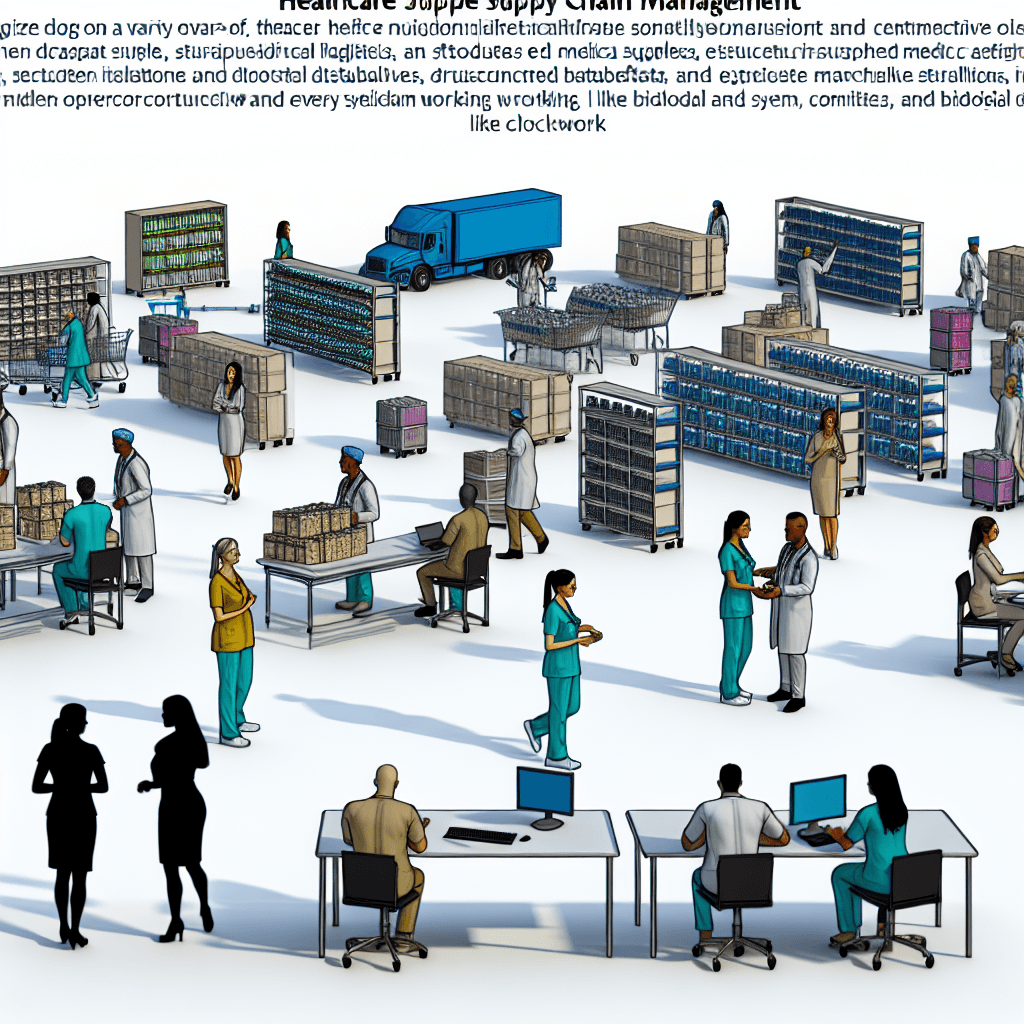Explore the growing healthcare supply chain management market, focusing on efficiency and cost reduction in medical supply logistics.
Healthcare Supply Chain Management Market

Table of Contents
- Exploring the Healthcare Supply Chain Management Market
- Understanding Healthcare Supply Chain Management
- Key Drivers of the Healthcare Supply Chain Management Market
- Challenges in Healthcare Supply Chain Management
- Technological Innovations Shaping the Future
- Case Studies: Success Stories in Healthcare Supply Chain Management
- Market Analysis and Future Outlook
- Conclusion: Key Takeaways
Exploring the Healthcare Supply Chain Management Market

The healthcare supply chain management market is a critical component of the healthcare industry, ensuring the efficient flow of medical products from manufacturers to patients. This market encompasses a range of activities, including procurement, inventory management, distribution, and logistics. In this article, we will delve into the complexities of this market, explore its key drivers, and examine how technology is revolutionizing healthcare supply chains.
Understanding Healthcare Supply Chain Management
Healthcare supply chain management (HSCM) involves the oversight and management of the flow of healthcare goods and services from manufacturer to end user. It includes the sourcing of medical supplies, managing inventories, aligning logistics, and ensuring products are delivered in a timely and cost-effective manner. Effective supply chain management is crucial for healthcare providers as it directly impacts service quality, patient safety, and overall operational efficiency.
Key Drivers of the Healthcare Supply Chain Management Market
Several factors are propelling the growth of the healthcare supply chain management market:
- Increasing Demand for Healthcare Services: As global populations age and chronic diseases become more prevalent, the demand for healthcare services is rising, necessitating robust supply chain systems.
- Cost Reduction Pressures: Healthcare providers are under constant pressure to reduce costs while maintaining high standards of care, driving the need for efficient supply chain solutions.
- Technological Advancements: Innovations in technology, such as cloud computing, IoT, and AI, are transforming supply chain operations, making processes more efficient and transparent.
- Regulatory Compliance: Increasing regulations regarding the traceability and safety of medical supplies encourage healthcare providers to adopt advanced supply chain management solutions.
Challenges in Healthcare Supply Chain Management
Despite its importance, managing a healthcare supply chain comes with several challenges:
- Complexity of Supply Chains: Healthcare supply chains are often fragmented and involve many stakeholders, making management complex.
- Data Management Issues: The vast amount of data generated in healthcare supply chains can be difficult to manage and analyze without sophisticated tools.
- Regulatory Compliance: Navigating the myriad of regulations across different regions can be challenging.
- Risk of Counterfeit Products: The healthcare sector is susceptible to the infiltration of counterfeit products, which can compromise patient safety.
Technological Innovations Shaping the Future
Technology plays a pivotal role in the evolution of healthcare supply chain management. Here are some key technological trends:
- Blockchain Technology: Offers potential for improving traceability and security in the supply chain, ensuring that all transactions are transparent and tamper-proof.
- Artificial Intelligence and Machine Learning: These technologies help in predictive analytics, demand forecasting, and inventory optimization.
- Internet of Things (IoT): IoT devices can track products throughout the supply chain in real-time, improving logistics and reducing losses.
- Cloud-Based Solutions: Cloud computing facilitates better data integration and collaboration across the supply chain.
Case Studies: Success Stories in Healthcare Supply Chain Management
Several healthcare organizations have successfully implemented advanced supply chain management solutions:
- Mayo Clinic: By integrating RFID technology, Mayo Clinic has been able to enhance the tracking of medical supplies, leading to significant improvements in inventory management and cost savings.
- Kaiser Permanente: Kaiser’s advanced supply chain management system has enabled it to reduce waste and improve the efficiency of its operations, ensuring that patients receive the right products at the right time.
Market Analysis and Future Outlook
The global healthcare supply chain management market is expected to grow significantly in the coming years. According to a report by Grand View Research, the market size was valued at USD 2.3 billion in 2020 and is expected to expand at a compound annual growth rate (CAGR) of 11.0% from 2021 to 2028. This growth is attributed to the increasing adoption of cloud-based solutions, AI, and blockchain technologies.
North America currently dominates the market, owing to the presence of a well-established healthcare infrastructure and the early adoption of advanced technologies. However, Asia-Pacific is expected to witness the highest growth rate due to increasing healthcare expenditures and the rising adoption of healthcare IT solutions in the region.
Conclusion: Key Takeaways
The healthcare supply chain management market is crucial for the efficient operation of healthcare services. Driven by technological advancements and the growing need for cost-effective healthcare delivery, this market is poised for significant growth. Organizations that embrace innovative technologies and streamline their supply chain processes can expect to see substantial benefits, including improved operational efficiency, reduced costs, and enhanced patient care.
As the market continues to evolve, staying informed about the latest trends and technologies will be key for healthcare providers looking to optimize their supply chain operations and meet the increasing demands of the healthcare industry.








